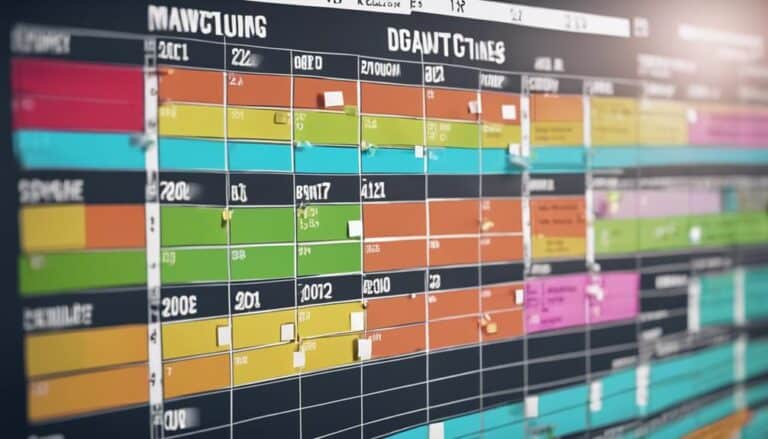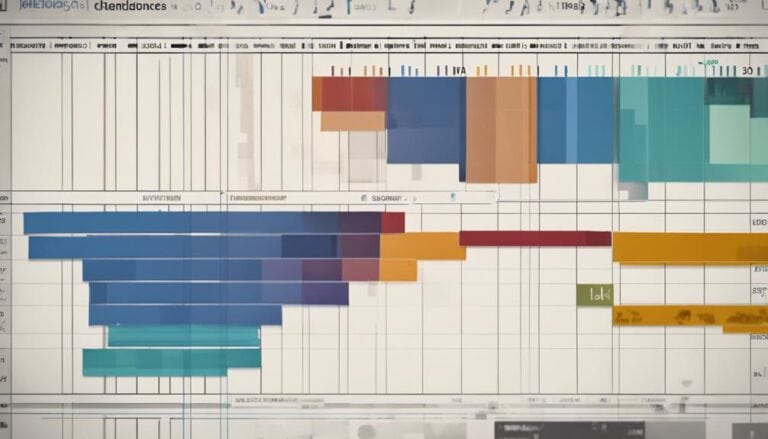Imagine construction schedules as finely tuned instruments, where the balance of time is akin to a delicate dance between progress and efficiency.
However, have you pondered if more time is always the key to success in these intricate choreographies? The allure of extending deadlines may seem appealing, offering a cushion for unexpected challenges. Yet, the repercussions of prolonged timelines can often outweigh the benefits.
Explore the complexities of construction scheduling and the nuanced considerations that underlie the quest for optimal project durations.
Key Takeaways
- Balancing time and resources is crucial for efficient construction scheduling.
- Extended project schedules can lead to increased costs and risks.
- Proper resource allocation within designated timeframes enhances project outcomes.
- Strategic time optimization strategies improve productivity and mitigate uncertainties.
Importance of Efficient Construction Scheduling
Efficient construction scheduling plays a crucial role in minimizing costs and maximizing productivity on construction projects. By strategically planning the sequence of tasks and allocating resources effectively, construction scheduling ensures efficient resource utilization. This optimization prevents unnecessary idle time and reduces overall project costs. Moreover, proper scheduling directly impacts project completion by preventing delays and ensuring timely delivery.
When construction schedules are well-structured, they enhance communication and coordination among project stakeholders, leading to smoother execution. The efficiency gained from effective scheduling also improves risk management by proactively identifying and addressing potential issues before they escalate. Streamlining construction schedules not only boosts productivity but also enhances workforce morale, as clear timelines and well-defined tasks contribute to a more organized work environment.
In essence, prioritizing efficient construction scheduling is essential for successful project outcomes, cost control, and overall project efficiency.
Factors Influencing Project Time Management
Balancing project deadlines with realistic timelines is a critical aspect of managing project time effectively, considering various factors that can influence construction schedules. When it comes to project time management, several key elements play a significant role:
- Resource Allocation: Efficient allocation of resources such as labor, materials, and equipment is essential for staying on schedule. Proper resource management ensures that tasks are completed on time and within budget.
- Critical Path: Identifying the critical path, which is the sequence of tasks that determine the project's duration, is crucial for effective time management. Focusing on activities along the critical path helps prioritize tasks to prevent delays.
- Project Management Software: Leveraging project management software can streamline scheduling processes, enhance collaboration among team members, and provide real-time insights into project progress. These tools help project managers make informed decisions to optimize project timelines.
Considering these factors and leveraging tools like project management software can greatly influence the success of construction projects by ensuring efficient time management practices.
Impact of Extended Project Schedules
What are the consequences of extending project schedules beyond the initial timeline? Extended project schedules can have significant impacts on various aspects of a construction project. One of the primary consequences is the increased costs associated with prolonged timelines. These costs can arise from extended labor expenses, continued equipment rental, and additional overhead costs that accumulate over time. Moreover, longer construction schedules can lead to delayed revenue generation for project owners or stakeholders, affecting cash flow and project profitability. The table below summarizes the key impacts of extended project schedules:
| Impact of Extended Project Schedules |
|---|
| Increased Costs |
| Delayed Revenue Generation |
| Impact on Cash Flow and Profitability |
Protracted timelines also introduce risks related to market fluctuations or regulatory changes, further complicating project outcomes. Additionally, extended project durations may negatively affect team morale, productivity, and stakeholder confidence in the project's success. Balancing the need for more time with the associated costs and risks is crucial in managing project schedules effectively.
Balancing Time and Resource Allocation
To optimize project efficiency and productivity in construction schedules, careful allocation of time and resources is essential. Balancing time and resource allocation in a construction schedule requires strategic planning and coordination to achieve project success.
- Efficient Resource Management: Proper allocation of resources within the designated timeframe is crucial for project success. It involves identifying the necessary resources, their optimal utilization, and ensuring they're available when needed.
- Timely Delivery: Striking the right balance between time allocation and resource utilization is vital to ensure timely project completion. Allocating too much time can lead to increased costs, resource wastage, and potential delays, while inadequate time allocation may compromise the quality of work.
- Risk Mitigation: Careful planning of time and resources can minimize project risks and enhance overall project outcomes. By aligning resource allocation with project timelines, you can mitigate uncertainties and improve the project's chances of success.
Strategies for Time Optimization in Construction
For efficient time optimization in construction projects, strategizing task prioritization and resource allocation is paramount to meeting project milestones successfully. Effective project planning involves breaking down tasks into manageable segments, identifying critical path activities, and setting realistic timelines.
Resource allocation plays a crucial role in ensuring that the necessary materials, equipment, and manpower are available when needed. Utilizing construction software can streamline scheduling, improve coordination among team members, and minimize the risk of errors. By leveraging technology, project managers can track progress, monitor budgets, and communicate changes in real-time, enhancing overall efficiency.
Implementing daily huddles for team alignment fosters collaboration, enables quick issue resolution, and keeps everyone focused on project goals. Proactive identification and mitigation of potential roadblocks help prevent costly delays, ensuring that the project stays on track.
Templating work processes can automate routine tasks, reduce rework, and boost productivity by standardizing project management procedures.
Evaluating Long Vs. Short Project Durations
Considering the impact on costs, productivity, and stakeholder satisfaction, evaluating the duration of construction projects is a critical decision-making process. When assessing long versus short project durations, it's essential to analyze various factors to determine the most suitable timeline for your construction project.
- Planning Phase: The duration of a project significantly affects the planning phase. Longer schedules allow for more detailed planning, while shorter durations require swift and efficient decision-making processes.
- Project Scope: Aligning the project duration with the scope ensures that all tasks can be completed effectively. Longer durations may accommodate scope changes, but shorter timelines demand precise adherence to the initial project scope.
- Resources Effectively: Efficient resource utilization is crucial in construction projects. Shorter durations require optimal resource management to ensure tasks are completed on time, while longer schedules may allow for more flexibility in allocating resources.
Enhancing Productivity Through Time Management
To enhance productivity through time management in construction, focus on efficient task allocation to minimize downtime periods.
By strategically assigning tasks and optimizing work schedules, you can maximize output and minimize idle time on the construction site.
This approach ensures that resources are utilized effectively, leading to smoother workflows and timely project completion.
Efficient Task Allocation
Efficient task allocation in construction schedules plays a pivotal role in enhancing productivity by ensuring optimal utilization of resources at the right time. Properly managing tasks can lead to reduced wasted time, optimized resource utilization, and improved project efficiency.
To achieve this, it's essential to:
- Identify critical path activities
- Assign responsibilities clearly
- Sequence tasks logically to minimize delays
Task allocation strategies help prevent bottlenecks, streamline workflow, and maintain project momentum. Prioritizing tasks, balancing workloads, and closely monitoring progress are crucial elements in achieving optimal efficiency and meeting project deadlines effectively.
Minimizing Downtime Periods
Enhancing productivity through effective time management involves strategically minimizing downtime periods in construction schedules to maximize work efficiency.
By reducing idle time between tasks, construction teams can ensure continuous progress, leading to cost savings, improved resource utilization, and timely project completion.
Optimizing scheduling to minimize downtime not only increases productivity levels but also helps meet project deadlines.
Proactive measures to reduce downtime result in smoother project workflows, increased output, and enhanced overall project performance.
Strategic planning and efficient time management in construction schedules are essential for maintaining a steady workflow, avoiding delays, and ultimately achieving successful project outcomes.
Tools for Effective Construction Schedule Management
Utilize Gantt charts to visually organize project tasks and timelines efficiently, ensuring effective construction schedule management. Implement kanban boards for task management and progress tracking in construction scheduling. Utilize project calendars to plan and schedule project activities effectively. Use resource management software for allocating and managing teams, equipment, and materials. Leverage project management tools for real-time updates and monitoring of construction schedules.
Gantt charts offer a comprehensive overview of project timelines, task dependencies, and progress tracking. Kanban boards enhance task management by visualizing workflow stages and facilitating team collaboration. Project calendars assist in scheduling activities, milestones, and deadlines, ensuring efficient project planning. Resource management software optimizes resource allocation, streamlining team assignments, equipment usage, and material procurement. Project management tools provide a centralized platform for communication, document sharing, and real-time updates, enabling effective construction project management.
Frequently Asked Questions
What Makes a Good Construction Schedule?
Efficient planning, realistic deadlines, and clear project milestones are key components of a good construction schedule. Incorporating critical path analysis and stakeholder involvement ensures timely completion. Utilize project management software for streamlined coordination and contingency planning.
Why Is Time Important in Construction?
In construction, time is crucial for meeting deadlines, enhancing productivity, and ensuring efficiency. Effective time management, planning, and coordination are vital. Delays impact profitability and resource utilization. Timely completion builds reputation and business opportunities.
Which Unit of Time Is Most Commonly Used With Construction Schedules?
When planning construction schedules, the most common unit of time used is the day. It allows for detailed tracking of daily tasks, ensuring timely progress. From daily tasks to weekly updates and monthly milestones, days provide a structured framework for project management.
What Is the Most Popular Method for Scheduling Construction Projects?
When scheduling construction projects, the Critical Path Method (CPM) is widely favored. It helps identify dependent tasks, determine project duration, allocate resources efficiently, and ensure timely completion. CPM, along with Gantt Charts, is crucial in project management.
Conclusion
As you navigate the intricate web of construction scheduling, remember that time is a double-edged sword. Just as a skilled craftsman carefully wields their tools to create a masterpiece, so too must you delicately balance the allocation of time in your projects.
Like a conductor orchestrating a symphony, efficiency and precision are key in ensuring the harmonious completion of your construction endeavors. Stay vigilant, stay strategic, and watch your projects soar to new heights.





